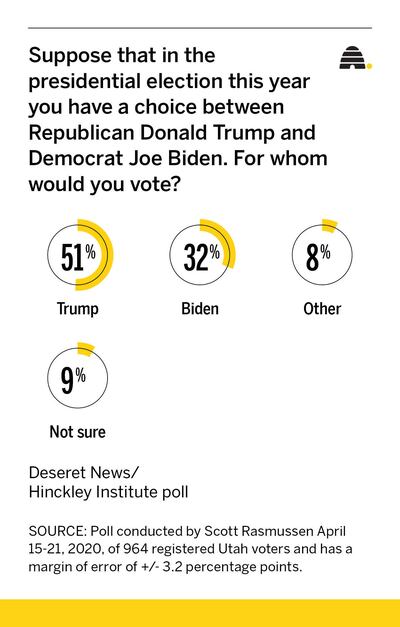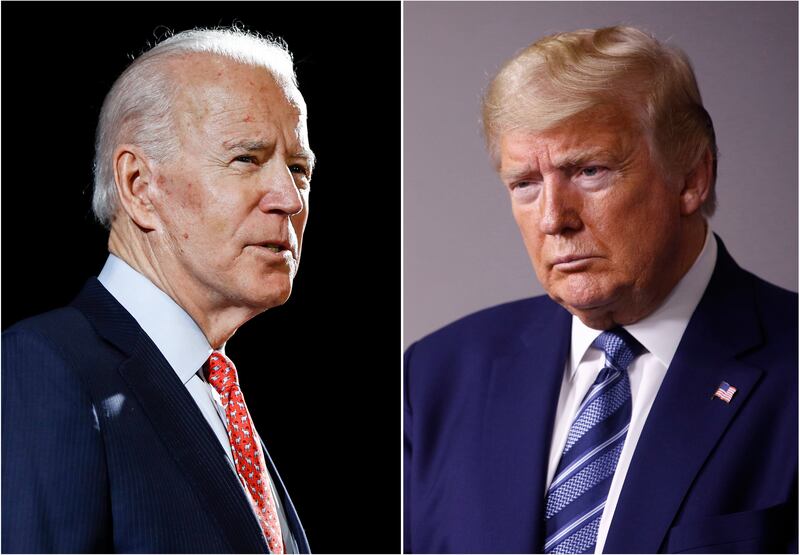SALT LAKE CITY — President Donald Trump continues to maintain a sizable lead in Utah over his presumptive Democratic challenger, former Vice President Joe Biden, according to a new Deseret News/Hinckley Institute of Politics poll.
Just over half of Utahns, 51%, said they would vote to reelect the Republican president, compared to 32% who would cast their ballot for Biden. The poll was conducted April 15-21 by independent pollster Scott Rasmussen of 964 registered Utah voters and has a margin or error of plus or minus 3.2 percentage points.

The same poll found 57% of Utahns approve of the job Trump is doing, a number that is unchanged from March.
Jason Perry, director of the University of Utah’s Hinckley Institute of Politics, said the poll results show that Utahns not only approve of how the president is handling the COVID-19 outbreak, they see him as best-equipped to handle the economic fallout from the deadly virus.
“For right now, he is still owning the economic argument, that he is the one who is going to be able to bring the United States out of the economic state that it’s in right now,” Perry said. “It looks like he is poised still to win reelection in Utah. ... The reality is that people do tend to vote with the 401(k)s and their wallets.”
Biden could see a boost in his Utah numbers from his vice presidential pick, Perry said, particularly if he adds a moderate seen as strong on economic issues to the Democratic ticket. The former vice president has said he will choose a woman as his running mate but has not been more specific.
Perry noted that in Utah’s 4th Congressional District, seen as the state’s most competitive, Biden does slightly better and Trump, slightly worse, with 46% of voters saying they’re for the Republican and 38%, for the Democrat, in the presidential race.
Those results are good news for Rep. Ben McAdams, Utah’s only Democrat in Congress, Perry said, since they underscore that he’s running for reelection in a district “where there is a segment of the population that will move and is not as set for Donald Trump.”
Trump won Utah, a state that hasn’t voted for a Democrat for president since 1964, with just 45.5% of the vote in 2016. That was his lowest margin of victory in any state that he won in the last presidential election. He also came in third in Utah’s 2016 GOP presidential caucus vote, trailing Texas Sen. Ted Cruz and then-Ohio Gov. John Kasich.
But the president easily won Utah’s Super Tuesday Republican presidential primary March 3 with nearly 88% of the vote. Biden came in second in Utah’s Democratic presidential primary behind Vermont Sen. Bernie Sanders, ending up with just over 18% of the vote.
Longtime Utah Trump supporter Don Peay said he expects the president to win big in Utah in November “if there is a reasonable outcome to COVID and a reboot of the economy.” Peay joked that the only chance Biden has to declare victory in Utah is if the former vice president confuses the state with Colorado.
He said the list of reasons Trump is leading with Utah voters is long, including that he “rebuilt” the economy, in part by rolling “back the ‘elite globalists’ in the Republican Party who sold out our manufacturing and energy,” and added two conservative justices to the U.S. Supreme Court.
Biden surrogate Scott Howell, a former state Senate minority leader, said he sees the results as positive given that the pandemic has halted traditional campaigning and forced Biden to reach out to voters from his Delaware home that now includes a TV studio in the basement while Trump holds daily White House briefings on the virus.
“I think to get a third of the vote in the circumstances that we’re in is remarkable. Because one candidate has a free forum every day for up to 2, 2 1⁄2 hours and the other candidate is stuck down in his basement,” Howell said.
Perry said it’s telling that only 9% of Utahns said they were unsure of their choice in the upcoming president election. Another 8% said they favored another, unnamed candidate.
“This poll was conducted during the time when the economy was taking a dive and people were talking about who should have done what, when. Those are questions that will continue to go forward,” he said. “But for right now, President Trump is not taking the blame, the full blame.”


